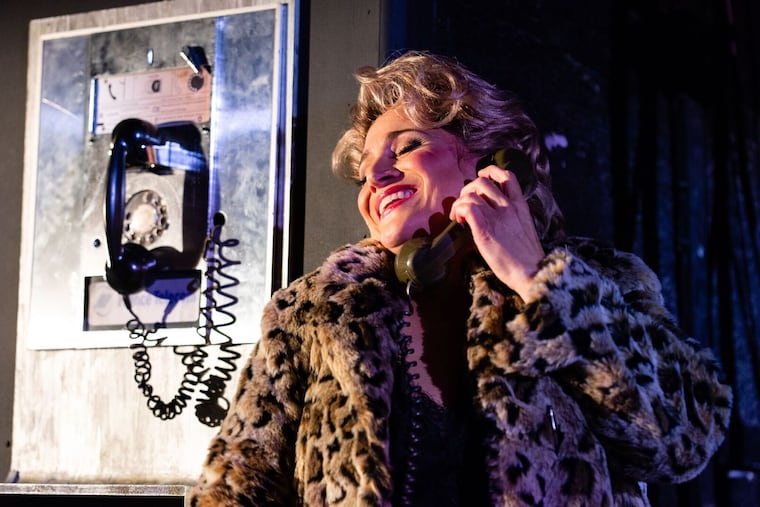With Patricia Racette, O18 unveils a reimagined ‘La Voix humaine’
The Poulenc work becomes part of a larger evening with a new musical drama based on Cocteau characters.

Is Opera Philadelphia diverting its audience's attention from great music? The company in recent seasons has put a lot of creative energy into devising entry points beyond the musical score — stylish visuals, innovative production concepts, and, let's be frank, singers who appeal to the eye as well as the ear.
The latest arrival, though, an expanded context for Poulenc's La voix humaine, crosses a line into pretentious distraction.
The opera itself was left untouched by any silliness. This 40-minute gem, a one-act vehicle for a lone soprano, is startling in its terrible beauty. The audience eavesdrops on a woman on the phone with her ex-lover. We hear only her end of the conversation, but it is enough to allow us to conclude that the severed relationship has left her shattered and delicate, qualities that Poulenc heightens with incredible musical precision.
Here, for three-quarters of an hour, Opera Philadelphia triumphed — in casting Patricia Racette as the soprano and engaging director James Darrah, and by melding the piece with the cabaret-like immediacy of the Theatre of Living Arts on South Street. When Racette walked out into the middle of the audience singing only a foot or two from your ear, her suffering became yours.
>> READ MORE: Fall Arts in Philadelphia
Because it's a miniature, the opera has often been presented as a double-bill (Racette has performed it alongside Puccini's Gianni Schicchi with Chicago Opera Theater). Opera Philadelphia should be applauded for aiming for a more innovative approach, even if it misses the mark.
Darrah prefaced La voix humaine with another work of his own construction heard Saturday night in this first performance as part of the O18 festival. The entire evening, dubbed "Ne Quittez Pas," was more curious spectacle than revelation.
It started with a promising idea. Darrah wove together Poulenc songs set to Apollinaire, texts by Rilke and Jean Cocteau (from whose play La voix humaine was taken), and added several actors based on Cocteau characters to create a twisted polyamorous musical drama before Poulenc's opera. Its narrative or atmospheric purpose was hard to discern, but it involved various sexual pairings, jealousy, role-playing, restraints, a blindfold and some modest disrobing.
The misstep wasn't the sex itself, though you did suspect it was edgy for edginess' sake. The problem was that the music was so gorgeous — Poulenc songs, beautifully rendered by baritone Edward Nelson, who brought new meaning to the word multitasking — that you wept for the way they got overshadowed by the stage action.
Pianist Christopher Allen had a wonderful feel for Poulenc's alternating sweetness and acid, and I often wished Darrah had granted both him and Nelson the simple visual quiet of a small white spotlight. Audiences have imaginations, too, and sometimes you should give them some credit. There's a magnificence to Poulenc's music that needs no special gift-packaging.
How this becomes a film Darrah and Opera Philadelphia plan to assemble from these elements and others is fascinating to ponder because a completely different set of choices is possible.
The conclusion you could have drawn was that Nelson in the kinky Bob Fosse-like prologue was the young lover whose loss Racette lamented in La voix humaine. As a woman of a certain age, Racette as Elle was clingy and pathetic, yet she drew sympathy. She did it mostly vocally. By changing her sound, the speed of her breath, by allowing her sound to deteriorate in volume and quality at the ends of phrases to emphasize certain words or emotions, she conveyed a sophisticated characterization.
It would be nice to think that she'll take more risk here and there in one of the subsequent performances (through Sept. 30). She has a strong partner in Allen (this production uses piano rather than orchestra, and is sung in French with English supertitles).
Part of the power of the role stems from Cocteau's text. He doesn't lecture. Questions about the pathology of this particular doomed relationship hover like unresolved chords, and that's a beautiful thing. Cocteau and Poulenc knew that just because one knows how to graphically expound upon certain human equations doesn't necessarily mean one should.
OPERA REVIEW
Ne Quittez Pas: A Reimagined La voix humaine
- Presented as part of Opera Philadelphia's Festival O18, the production repeats Sept. 27, 29, and 30 at Theatre of Living Arts. Tickets: $150-$210. Information: 215-732-8400 or operaphila.org.